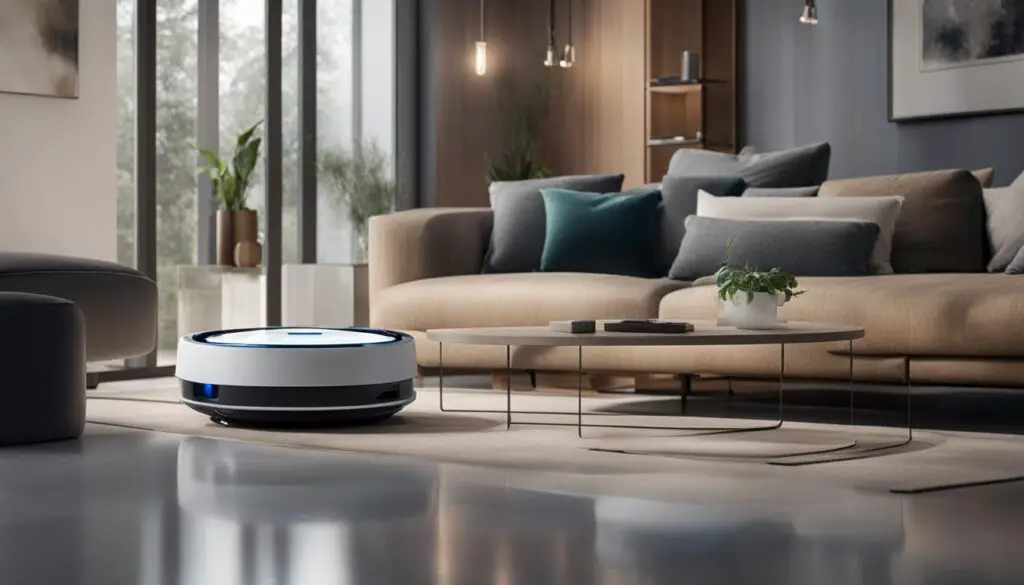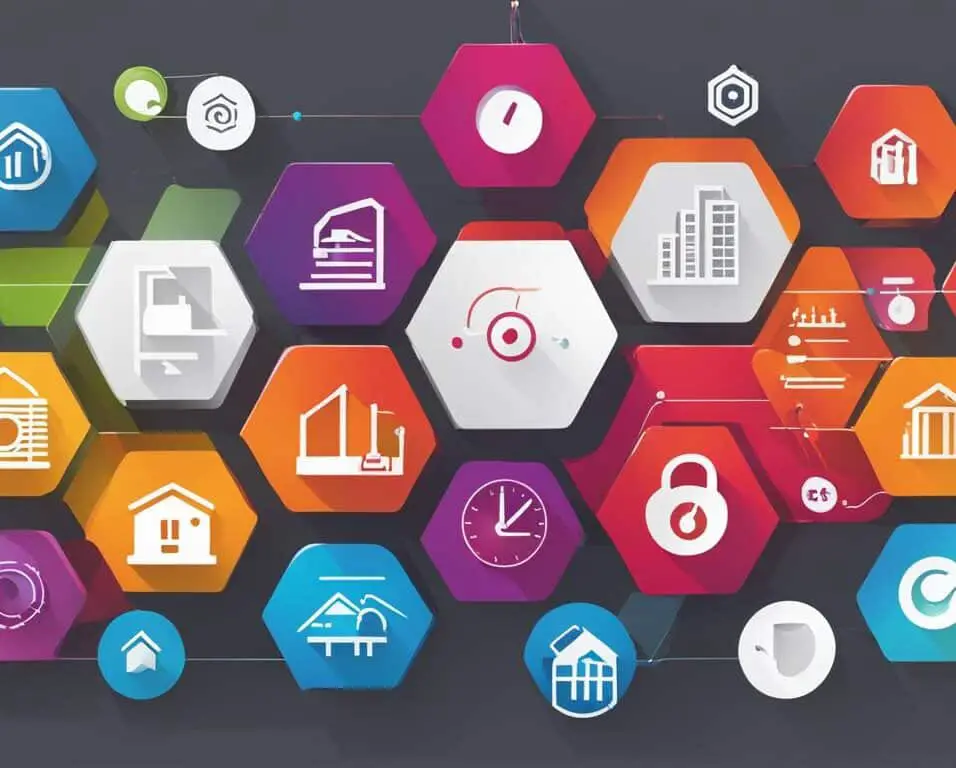Smart Home Evolution: The Role of AI
Artificial Intelligence (AI) is revolutionizing the concept of smart homes, transforming the way we live and interact with our environment. AI plays a transformative role in creating smart homes that are more responsive, efficient, and secure. It encompasses various aspects such as intelligent home automation, enhanced home security, household maintenance and management, and personalizing the home experience. Additionally, AI in smart homes raises important challenges and ethical considerations around data privacy and security.
Key Takeaways:
- AI is redefining smart homes by making them more responsive, efficient, and secure.
- Intelligent home automation, enhanced security, and personalized experiences are some of the transformative roles of AI in smart homes.
- Data privacy and security are important considerations when implementing AI in smart homes.
- AI-driven home assistants and robotic cleaners are streamlining tasks and improving convenience.
- AI-powered systems are enhancing home security by offering advanced surveillance and smart lock solutions.
AI-Driven Home Assistants: Powering Convenience and Efficiency
AI-driven home assistants, such as Amazon’s Alexa and Google Assistant, are leading the way in smart home automation. These intelligent assistants seamlessly control and manage smart home devices, providing homeowners with unparalleled convenience and efficiency.
“AI-driven home assistants are revolutionizing the way we interact with our homes. With just a few voice commands or a tap on a smartphone app, we can control our devices, manage tasks, and access a wealth of information right at our fingertips.”
Thanks to AI technologies, homeowners can effortlessly adjust settings, control appliances, and perform various tasks in their smart homes. Say goodbye to the days of manually switching off lights or adjusting thermostats. With AI-driven home assistants, everything is just a voice command away.
Energy management is also a key benefit of AI-driven home assistants. With the ability to control heating, cooling, and lighting systems, AI optimizes energy usage to reduce costs and minimize environmental impact.
Imagine coming home to a perfectly lit and temperature-controlled environment, customized to your preferences, all while saving energy. AI-driven home assistants make this a reality.
Benefits of AI-Driven Home Assistants
| Benefits | Description |
|---|---|
| Convenience | Control and manage smart home devices with voice commands or smartphone apps. |
| Efficiency | Perform tasks easily and adjust settings effortlessly. |
| Energy Management | Optimize energy usage by controlling heating, cooling, and lighting systems. |
AI-driven home assistants are transforming the way we interact with our smart homes, providing unparalleled convenience, efficiency, and energy management.
Stay tuned for the next section, where we discover how AI-powered systems are enhancing home security.
Enhancing Home Security with AI-Powered Systems
AI-powered systems are revolutionizing home security, providing homeowners with enhanced levels of protection and peace of mind. These advanced systems leverage the power of artificial intelligence to create a smart and secure environment for residential properties.
Advanced Surveillance Systems and AI-Powered Cameras
One of the key components of AI-enhanced home security is the integration of advanced surveillance systems and AI-powered cameras. These cutting-edge cameras are equipped with sophisticated algorithms that enable them to recognize familiar faces and detect unusual activities. By continuously analyzing the surroundings, AI-powered cameras can identify potential security threats and promptly alert homeowners.
“The integration of AI-powered cameras has significantly enhanced home security, providing homeowners with real-time information about the activities around their property.” – Emily Thompson, Security Expert
Smart Locks and Security Systems
AI-powered systems also include smart locks and security systems that are managed by intelligent algorithms. These systems offer robust security features, allowing homeowners to have complete control over access to their homes. With AI technology, homeowners can remotely manage locks, monitor security cameras, and receive instant notifications in case of any security breaches.
Enhanced Security and Peace of Mind
With AI-powered systems in place, homeowners can enjoy enhanced security and peace of mind. The integration of AI in home security ensures a proactive approach to identifying potential threats and taking immediate action. From deterring burglars to safeguarding against unauthorized access, these systems provide homeowners with an added layer of protection for their homes and loved ones.
Comparison of AI-Enhanced Home Security Systems
| Features | Traditional Security Systems | AI-Enhanced Security Systems |
|---|---|---|
| Face recognition | No | Yes |
| Real-time alerts | No | Yes |
| Remote access and control | Basic | Advanced |
| Intelligent threat detection | No | Yes |
| Integration with other smart devices | Limited | Extensive |
Streamlining Household Maintenance and Management with AI
In today’s fast-paced world, managing household chores and maintenance can be a daunting task. However, with the advancements in technology and the integration of AI, homeowners can now simplify their management responsibilities and free up time for other activities.
One of the most significant contributions of AI in household management is the development of robotic cleaners. These innovative devices, such as robotic vacuum cleaners, utilize AI algorithms to learn the layout of the home and optimize cleaning routes over time. This means that homeowners can trust these robotic cleaners to efficiently clean their homes, saving time and effort in their daily chores.
But it doesn’t stop there. AI also enables predictive maintenance, which can help homeowners stay ahead of potential maintenance issues. By analyzing data and patterns, AI systems can predict when certain appliances or systems might require attention, allowing homeowners to take proactive measures to prevent costly breakdowns or repairs.
For example, an AI-powered system can monitor the performance of a heating or cooling system and detect anomalies that could indicate a potential issue. It can then alert homeowners to the problem and provide recommendations on what actions to take. This not only helps prevent major disruptions but also saves homeowners from unnecessary expenses.
By streamlining household maintenance and management through AI, homeowners can experience a simplified and more efficient lifestyle. The automation of tasks that were once time-consuming and repetitive allows homeowners to focus on more important aspects of their lives, such as spending time with family or pursuing personal interests.
The Benefits of Streamlining Household Maintenance and Management with AI:
- Saves time and effort in daily chores
- Predicts maintenance needs before they escalate
- Prevents costly breakdowns and repairs
- Allows homeowners to focus on other activities and responsibilities
With AI-driven technology, household management has become more efficient and convenient than ever before. Robotic cleaners and predictive maintenance are just the beginning of a revolution that aims to simplify our lives and create smarter, more manageable homes.

As we embrace the possibilities of AI, the future holds even more exciting advancements in household management. From automated gardening systems to smart appliances that can connect and communicate with each other, the opportunities to simplify and enhance our homes are limitless.
Incorporating AI into our daily lives is not just about convenience; it’s about creating smarter, more efficient homes that work for us. By streamlining household maintenance and management with AI, we can truly transform the way we live.
Personalizing the Smart Home Experience with AI
AI plays a crucial role in creating a personalized and immersive smart home experience. With its advanced capabilities, AI adapts the environment to suit the preferences and habits of the residents, ensuring a customized ambiance and unparalleled comfort.
Adaptive Lighting and Temperature Control
One of the key ways in which AI personalizes the smart home experience is through adaptive lighting and temperature control. AI systems intelligently adjust the lighting levels and temperature based on factors such as the time of day, weather conditions, and personal preferences.
Imagine waking up to a gently lit bedroom in the morning, with the lights gradually brightening to simulate a sunrise. Throughout the day, AI dynamically adjusts the lighting to match the natural daylight, creating a harmonious and energizing atmosphere. In the evening, the lighting can be dimmed to a warm and cozy glow, perfect for relaxation and winding down.
Similarly, AI-controlled temperature systems analyze the occupants’ preferences and learning algorithms to optimize heating and cooling. By adapting to individual comfort levels, AI ensures a pleasant and cozy environment, helping homeowners save energy and reduce utility costs.
Curating Personalized Entertainment Options
AI goes beyond ambiance and temperature control to curate personalized entertainment options for smart homeowners. By understanding the tastes and moods of the residents, AI systems recommend tailored music playlists and suggest movies or TV shows that align with their preferences.
Whether it’s setting the right mood for a cozy dinner party or creating a lively atmosphere for a social gathering, AI can effortlessly create customized playlists that cater to the occasion. With just a voice command or a tap on a smartphone app, residents can enjoy a seamless and immersive entertainment experience.
Moreover, AI can learn from previous music and movie selections, adapting to evolving preferences and consistently offering personalized entertainment options. This level of customization elevates the overall smart home experience, making it truly unique to each individual or family.

Bringing it All Together
By integrating adaptive lighting, temperature control, and personalized entertainment options, AI takes the smart home experience to the next level. It creates an environment that not only satisfies the functional needs of residents but also caters to their unique preferences and desires.
With AI as the driving force behind personalized ambiance and entertainment, smart homes become more than just automated spaces. They become living environments that adapt and respond to the individual needs and lifestyles of the residents.
| Benefits of Personalized Smart Home Experience with AI | Example |
|---|---|
| Enhanced comfort and convenience | Adaptive lighting and temperature control create tailored environments that optimize comfort |
| Improved energy efficiency | AI-controlled temperature systems optimize heating and cooling based on individual preferences, reducing energy waste |
| Seamless entertainment integration | AI curates personalized music playlists and recommends movies or TV shows based on individual tastes and moods |
| Enhanced overall smart home experience | Personalized ambiance and entertainment options create a unique and immersive living environment |
Challenges and Ethical Considerations in AI-Enhanced Smart Homes
While AI-enhanced smart homes offer numerous benefits, they also raise important challenges and ethical questions. Ensuring the privacy and security of data collected by smart home devices is a major concern. With the increasing reliance on technology, the potential risks of data breaches and unauthorized access to personal information cannot be ignored. To maintain trust and protect personal data, robust data privacy measures must be implemented.
Another challenge is the dependence on technology and the potential loss of human control. As our homes become more automated and AI-driven, there is a need to strike a balance between the convenience and efficiency provided by AI and the need for human oversight and interaction. It is crucial to maintain a level of control over AI systems and ensure that homeowners have the final say in decisions affecting their homes and lives.
“With great power comes great responsibility.”
– Uncle Ben
Addressing these challenges requires a holistic approach that encompasses both technological and ethical considerations. Developers and manufacturers should prioritize security measures, continuously update software, and implement encryption techniques to protect user data. Additionally, transparency and clear communication regarding data collection and usage should be emphasized to build trust with homeowners.
Ethical Considerations in AI-Enhanced Smart Homes
| Ethical Consideration | Explanation |
|---|---|
| Data Privacy | Protecting personal information from unauthorized access and ensuring compliance with data protection regulations. |
| Security | Implementing robust security measures to prevent data breaches and unauthorized access to smart home devices. |
| Dependence on Technology | Finding the right balance between automation and human control to avoid over-reliance on AI systems. |
| Ethical Decision Making | Ensuring transparency, accountability, and human values in the design and operation of AI systems in smart homes. |
By addressing these challenges and ethical considerations, we can ensure the responsible and ethical development of AI-driven smart homes. It is crucial to strike a balance between the benefits of AI and the protection of users’ privacy, security, and control over their homes. With careful considerations, AI-enhanced smart homes can make our lives more convenient, efficient, and comfortable without compromising our values and ethical standards.
Conclusion
Smart Home Automation powered by AI technology is revolutionizing the way we live, transforming our houses into intelligent and responsive environments. The immense potential of AI in smart homes lies in its ability to provide enhanced convenience, efficiency, and security. Through intelligent home automation systems, advanced security features, and personalized experiences, AI is shaping the future of home living.
However, as with any technological advancement, the responsible development and implementation of AI in smart homes require addressing key challenges and ethical considerations. Safeguarding data privacy and security is of utmost importance, ensuring that the information collected by smart home devices remains protected. Moreover, striking a balance between AI automation and human interaction in the home environment is crucial to maintain a sense of control and personal connection.
The future holds promising technology trends for smart homes with AI at the center. Voice-controlled smart kitchens and AI-assisted home health monitoring are emerging trends that will further enhance the smart home experience. As technology continues to advance, smart homes will become even more responsive, tailored to our needs, and seamlessly integrated into our everyday lives. Smart Home Automation is a testament to the transformative power of AI, revolutionizing the way we live in the 21st century.
FAQ
How does AI revolutionize smart homes?
AI revolutionizes smart homes by transforming them into more responsive, efficient, and secure living spaces. It enables intelligent home automation, enhanced home security, household maintenance and management, and personalized experiences.
What are AI-driven home assistants?
AI-driven home assistants, such as Amazon’s Alexa and Google Assistant, are intelligent systems that control home devices, manage tasks, and provide information through voice commands or smartphone apps. They optimize energy usage, make it easier to control appliances, and perform various tasks.
How does AI enhance home security?
AI enhances home security by offering advanced surveillance systems with AI-powered cameras that can recognize faces and detect unusual activities. Smart locks and security systems managed by AI provide robust security and easy control to ensure maximum protection.
How does AI streamline household maintenance and management?
AI streamlines household maintenance and management by incorporating robotic cleaners that learn the layout of the home and optimize cleaning routes. It also predicts maintenance needs, alerting homeowners to potential issues before they escalate.
How does AI personalize the smart home experience?
AI personalizes the smart home experience by adapting the environment to the preferences and habits of the residents. It adjusts lighting and temperature based on time of day, weather, and personal preferences, and curates personalized entertainment options based on the tastes and moods of the residents.
What challenges and ethical considerations are associated with AI-enhanced smart homes?
AI-enhanced smart homes raise challenges concerning data privacy and security. Balancing the convenience of AI with the need for human oversight and interaction is also crucial. It is important to address these ethical considerations to ensure the responsible and ethical development of AI-driven smart homes.








